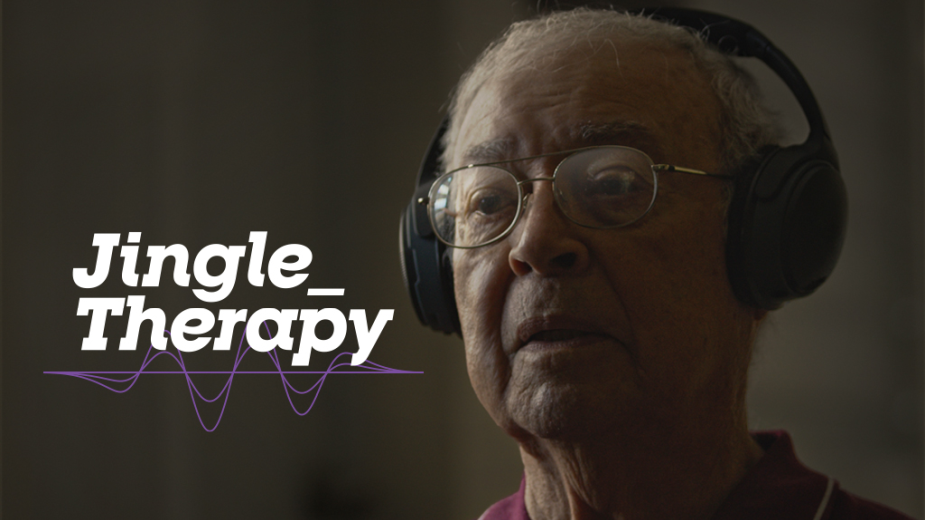
Problem Solved: Bringing Back Meaningful Memories to Alzheimer’s Patients Using Famous Jingles

Jingle Therapy is an alternative, non-pharmacological, easy-to-use, digital treatment for Alzheimer’s patients to bring back meaningful memories associated with famous jingles, to soothe their daily lives. It uses the power of music to reduce agitation and improve behavioral issues common in the middle-stages of Alzheimer’s.
The Problem
Alzheimer’s disease, the most common type of dementia, is a progressive disease causing loss of memory and other cognitive abilities serious enough to interfere with daily life. Over 100,000 people in Puerto Rico live with the condition, becoming agitated or aggressive as the disease worsens. We partnered with Spanish Broadcasting System (SBS), owner of the most well-known radio stations in the country, and the Puerto Rican Alzheimer’s Association to improve their lives.
In 2022, research at the University of Miami indicated people in Puerto Rico have a higher propensity for Alzheimer's, potentially due to a genetic variant they had uncovered. The disease is the fourth leading cause of death in people over 65 on the island with a four-time increase in the last 20 years. Studies have also shown music may reduce agitation and improve behavioral issues that are common in the middle-stages of Alzheimer’s.
Music is one the biggest passion points for Puerto Ricans. You see it reflected in the number of famous artists from this small island, including Hector Lavoe, Ricky Martin and today, Bad Bunny. It’s also reflected in the fact that Puerto Rico has the most radio stations per square mile than any other country in the world.
These two main reasons are why advertising jingles have been so popular over the decades. Brands like Coca-Cola and artists like El Gran Combo have created memorable jingles that impacted pop culture, allowing these short, catchy songs to earn a special place in the island’s collective memory. Bringing them back not only helped Alzheimer’s patients with a new palliative treatment, but it has also helped them remember happy moments from their youth.
Ideation
First, we analysed over 80 years of ads in SBS radios’ archives to identify the most popular jingles in Puerto Rico. We then went through the patient’s journey to understand the simplest way to create the therapy, with the caregiver a key part of the process. We also had to keep in mind that web and mobile interfaces are not always designed with an older audience in mind.
The first approach was to use available music platforms to create the therapy, but the key obstacle was personalisation. The jingles people listened to when they were young were different for each patient based on their age.
The answer was clear. We needed to create our own music platform to give patients and caregivers the opportunity to personalize their treatment based on their age, along with identifying the jingles that would help them to remember.
We used all music platforms as inspiration, understanding their limitations to create the perfect one for the idea. From Spotify to Soundcloud, we analysed all of them.
Prototype and Design
The biggest challenge was creating a music platform that allowed caregivers the opportunity to personalise the treatment for the Alzheimer’s patient – in the simplest way possible. We created digital personas of the caregivers to understand their digital skills and limitations, and then built the platform around it. Our research also explored how seniors use technology and offered recommendations on how our platform could be improved to meet their needs.
Live
Once we prototyped it, we tested it with caregivers from different ages, since sometimes caregivers were of the same generation as the patient. Users ages 65 and older face unique challenges when using websites and apps. While digital literacy among this demographic is rising, the designs needed to accommodate aging users. Too complex of a user experience (UX) – one with many small elements – might confuse older users. Of course, results impacted the design and UX as well.
Post-launch we continue to gather data from the jingles to improve the treatment results – bringing new ones to the platform to replace ones that have been less impactful.
It was truly an emotional project from the get-go. Seeing patients remember the jingles, sing along with them, and then have great interactions with their caregivers was the best part of the project by far.
Less than two months after launch, over 600 patients were reached, accumulating over 50,000 hours of therapy. Significant improvement was observed in memory, orientation, depression, and anxiety (HAD scale) in both mild and moderate cases; in anxiety (NPI scale) in mild cases; and in delirium, hallucinations, agitation, irritability, and language disorders in the group with moderate Alzheimer’s. The effect on cognitive measures was appreciable after only four Jingle Therapy sessions. To date, 12 partnerships with health institutions have been established around the island to use this as a regular form of therapy.













